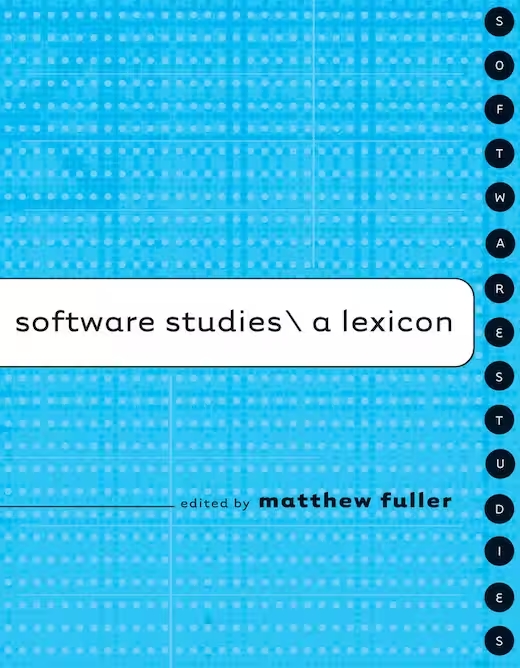Publication details
| Further contributors | edited by Matthew Fuller, with contributions by Adrian Mackenzie, Adrian Ward, Alexei Shulgin, Alison Adam, Andrew Goffey, Cecile Crutzen, Derek Robinson, Erna Kotkamp, Florian Cramer, Friedrich Kittler, Geoff Cox, Graham Harwood, Grzesiek Sedek, Joasia Krysa, Jussi Parikka, Lev Manovich, Marco Deseriis, Matti Tedre, Matthew Fuller, Michael Mateas, Michael Murtaugh, Morten Breinbjerg, Nick Montfort, Olga Goriunova, Richard Wright, Ron Eglash, Simon Yuill, Søren Pold, Steve Goodman, Ted Byfield, Warren Sack, Wendy Hui Kyong Chun, Wilfried Hou Je Bek |
| Publication |
This book concluded a multi-year research project on software and culture conducted from 2002 to 2006 in Willem de Kooning Academy’s first research program (lectoraat) and core research group consisting of Matthew Fuller (lector), Femke Snelting, Michael Murtaugh and Calum Selkirk. It is a cultural field guide to software: artists, computer scientists, designers, cultural theorists, programmers, and others who define a new field of study and practice.
Computing and digital media are essential to the way we work and live, and much has been said about their influence. But the very material of software has often been left invisible. In Software Studies, computer scientists, artists, designers, cultural theorists, programmers, and others from a range of disciplines each take on a key topic in the understanding of software and the work that surrounds it. These include algorithms; logical structures; ways of thinking and doing that leak out of the domain of logic and into everyday life; the value and aesthetic judgments built into computing; programming’s own subcultures; and the tightly formulated building blocks that work to make, name, multiply, control, and interweave reality.
The growing importance of software requires a new kind of cultural theory that can understand the politics of pixels or the poetry of a loop and engage in the microanalysis of everyday digital objects. The contributors to Software Studies are both literate in computing (and involved in some way in the production of software) and active in making and theorizing culture. Software Studies offers not only studies of software but proposes an agenda for a discipline that sees software as an object of study from new perspectives.
